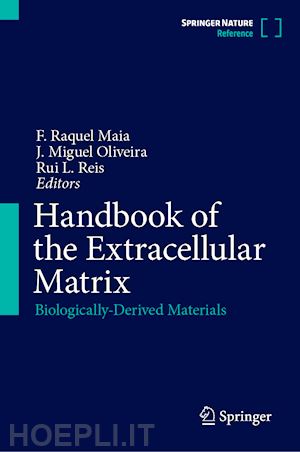
Questo prodotto usufruisce delle SPEDIZIONI GRATIS
selezionando l'opzione Corriere Veloce in fase di ordine.
Pagabile anche con Carta della cultura giovani e del merito, 18App Bonus Cultura e Carta del Docente
This book comprises 6 sections covering the fundamentals of the extracellular matrix, as well as the development and challenges of using biologically-derived materials, and its advanced biomedical applications. The first section is dedicated to the extracellular matrix, while the other 5 sections are each dedicated to a particular type of material. This book reports the fundamentals of the extracellular matrix and its impact on the development of innovative materials; provides an overview of the advanced methodologies used to develop biologically-derived materials; and describes the challenges of the synthesis and processing of the different materials. Furthermore, it presents the biological activities, structural and physicochemical properties of such materials, and the modification methods pursued to improve their inherent properties. The wide range of advanced applications are covered as well, including the combination with emerging technologies, underlying tissue-engineered scaffolding, drug delivery systems, 3D in vitro tissue and cancer models, 3D bioprinted models, bioinks, and more.
This reference work serves as a core reference for multidisciplinary students (undergraduates and Ph.D. students) and a wide range of established researchers and professionals working in the medical field, e.g., orthopaedics, radiology, dentistry, and cancer.
Dr. F. Raquel Maia obtained her Ph.D. in Biomedical Engineering from the University of Porto, in collaboration with the University of Nevada and University of Lisbon, in March 2014. In the same year, she started as a postdoctoral fellow at 3B’s Research Group, University of Minho. In 2017, she was awarded an FCT postdoctoral fellowship, which gave place to a Junior Investigator contract. She is currently focused in the development of bioengineered materials to model 3D native microenvironments for Tissue Engineering and Regenerative Medicine and the development of physiologically relevant in vitro models-on-chip for cancer research.
Dr. J. Miguel Oliveira is a Biochemist and holds a PhD in Materials Science and Technology (2009). Currently, he is a Principal Investigator with habilitation (Permanent staff) and Vice-President of the Institute of Biomaterials, Biodegradables and Biomimetics (I3Bs), University of Minho (PT). He has been internationally recognized in the field of biomaterials, tissue engineering and in vitro models. In Nov. 2023, he was appointed Fellow Biomaterials Science and Engineering (FBSE) for the excellent professional standing and high achievements. He is also member of the National Ethics Committee for Clinical Research (CEIC) from the Portuguese National Health System (SNS, PT).
Prof. Rui L. Reis is a Full Professor, Founding Director of 3B´s Research Group and Dean of the Institute of Biomaterials, Biodegradables and Biomimetics (I3Bs), University of Minho (UMinho). He is Director and Scientific Coordinator of the Associate Laboratory ICVS/3B´s (with UMinho Medical School) since 2011 and the CEO of the European Institute of Excellence on Tissue Engineering and Regenerative Medicine (TERM) since 2008. He is specially recognized for the introduction of several natural origin scaffolds and hydrogels with unique properties into the TERM field. He is one of the most well established, accomplished, and productive and highly-cited researchers in the World in the field of TERM and Biomaterials.











Il sito utilizza cookie ed altri strumenti di tracciamento che raccolgono informazioni dal dispositivo dell’utente. Oltre ai cookie tecnici ed analitici aggregati, strettamente necessari per il funzionamento di questo sito web, previo consenso dell’utente possono essere installati cookie di profilazione e marketing e cookie dei social media. Cliccando su “Accetto tutti i cookie” saranno attivate tutte le categorie di cookie. Per accettare solo deterninate categorie di cookie, cliccare invece su “Impostazioni cookie”. Chiudendo il banner o continuando a navigare saranno installati solo cookie tecnici. Per maggiori dettagli, consultare la Cookie Policy.